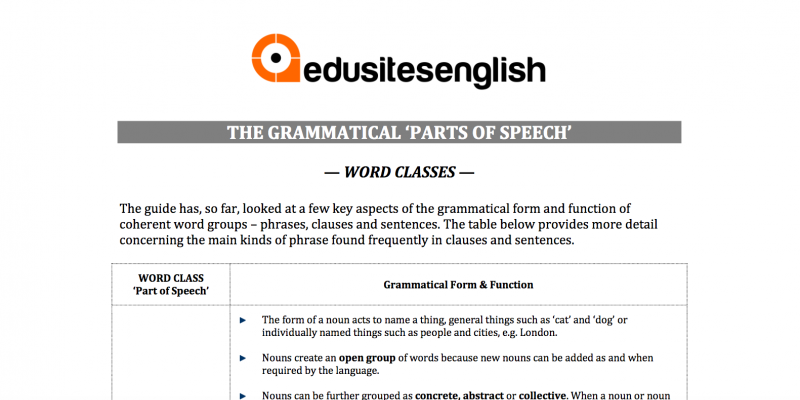

"Edusites English has been a game-changer for my classroom, providing expertly crafted resources that make teaching complex texts straightforward and enjoyable." "The revision guides and practice papers have given my students the confidence they need to excel in their exams, with noticeable improvements in their results." "Edusites English saves me so much time with its comprehensive lesson plans and study guides, allowing me to focus on what matters most—teaching and supporting my students." "The diverse range of materials, from text analysis to creative writing resources, keeps my students engaged and inspired in their English studies."
Autumn – and our minds turn to tackling the grittier of ‘language methods’ (or approaches, frameworks, or whatever they’re known as in your department). It’s grammar time! Having built up some confidence with ideas like lexis and semantics, it’s about this point in the term when things start to get a lot more technical and we want to really nail that terminology. As an area that many English teachers are a bit less confident in (having studied Literature rather than Language, to be honest), there’s plenty of support for you here at Edusites, so dive in, see what there is and select the approach that will best serve you and your students at this point.

Register now for our subject updates and FREE instant access to this article.
Already registered? Login below to continue reading this article.
Teachers are nothing less than miracle workers. Language has the power to move us. Language has the power to make us see tired and old things anew. Language has the power to create hope.
Of all the challenges in the English Language exam, question one fades into the background when compared to the complexities of question four, or the mental gymnastics for the analysis in questions two and three. Question one sits there. Unobtrusive. Inoffensive. Nonchalant. A little dream of a question, really. “Find four things…”. Can’t go wrong, right?
The language analysis in question two is a tricky little gem of a question. Most students feel pretty confident attacking this one, and usually even weaker students can pick up one or two marks. I’m going to split this into advice for those who are aiming for each separate ‘level’, because the advice I would give is quite different.
And now question three. You little tricky brute. It should be so simple! Teach structural devices, and how to analyse them, chuck in a couple of nice sounding technical terms to boost their confidence, and voila! Eight out of eight? NO.
What is the problem with question four? It should be as simple as teaching the difference between analysis and evaluation, point them in the right direction, and watch them go. But it isn’t.
AQA Love and Relationships Over the past 2 exam cycles, I have observed that the students who worked the hardest, who committed a vast about of subject knowledge to memory, were able to achieve grades far higher than targeted. They learn them and quote them but do they really know what ‘to do’ with them? As Amy Forrester stated ‘I began to realise that the key wasn’t just in the retention of quotations but in the knowledge of what to say about them’.
Allusions in Tess of the D’Urbervilles. Picture the scene: last July I see my 2018/19 timetable in my pigeonhole. It has all my new classes, including AS Level Literature. I’m nervous – we split classes, 1 teacher teaches Othello and love poetry, the other Tess of the D’Urbervilles and unseen prose. Othello and poetry? That’s my jam. I’d feel happy there. Hardy and his endless ramblings about pastoral Wessex? Not so much… So, obviously, I end up teaching Tess.
As an idea, Language and Power is so closely allied to Language and Gender, that it would make sense to teach this unit second as a grounding in ‘Power’ will provide a solid grounding in ‘Gender’. Equally, language-mediated via any form of technology, too, is frequently a site where power (and gender) relations are important and so dealing with Language and Technology last of all can work well.
Edusites and A Level English Language...Many of you will be looking to cover the topic of Child Language Acquisition (CLA) with Year 13 now, perhaps with an eye to providing it as a possible Investigation topic. On the Edusites English, we have 24 page printable booklet which contains a comprehensive guide to the topic, covering key concepts in a range of frameworks and the central theories in some detail.
NEA Investigation Basics Thinking about getting your year 13s started on Investigations? If so, don’t worry – we’ve got you covered. There’s a great guide here on Edusites, written with the AQA specification’s NEA in mind, but it should help you out too if you’re an Eduqas or OCR English Language teacher. The guide fits the requirements of the current specification, and has an example of a nice approachable music-themed project that you could easily show to a class and work through with them, to help them get their heads around what an investigation is.
